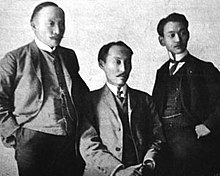Hague Secret Emissary Affair
| Hague Secret Emissary Affair | |
 | |
| Korean name | |
|---|---|
| Hangul | 헤이그 특사사건 |
| Hanja | 헤이그 特使事件 |
| Revised Romanization | Heigeu teuksa sageon |
| McCune–Reischauer | Heigŭ t'ŭksa sakŏn |
The Hague Secret Emissary Affair (Korean: 헤이그 특사사건) resulted from Emperor Gojong of the Korean Empire sending confidential emissaries to the Second Peace Conference at The Hague, the Netherlands, in 1907.[1]
Background
Following the Empire of Japan's victory over Russia in the 1904–1905 Russo-Japanese War, Japan sought to formalize its control over the Korean Peninsula. It assumed hegemony over the Empire of Korea with the Eulsa Treaty of 1905.[2]
Event
Emperor Gojong sent three secret emissaries, Yi Tjoune (이준, 李儁), Yi Sang-seol (이상설, 李相卨) and Yi Wi-jong (이위종, 李瑋鐘) to the Second Hague Peace Convention to declare the invalidity of Japanese diplomatic maneuvers, including the Japan–Korea Treaty of 1905 (Eulsa Treaty). Gojong's representatives asserted the monarch's rights to rule Korea independent of Japan. However, the nations at The Hague did not allow the emissaries to take part in the conference and blocked this diplomatic mission.[3]
Because of Russia's opposition to Japan, Nicholas II of Russia tried to help the three Korean emissaries to enter the convention hall, though these efforts were ultimately blocked by Japan.[4] Emperor Gojong's emissaries were unable to gain entry into the convention hall. Korea was no longer viewed as an independent nation by the nations, as Japan had assumed responsibility for its international representation.
In Korea
In Korea, Gojong of Korea was threatened his throne by Pro-Japanese cabinet formed by Itō Hirobumi. Song Byeong-jun, the Agriculture, and Industry Minister requested Gojong to visit Japan and apologize to Emperor Meiji or capitulate to Hasegawa Yoshimichi, the commander of Korean Residence Japanese Army.[5]
Rescission
In 1965, the treaties of Japan were confirmed to be "already null and void" by the Treaty on Basic Relations between Japan and the Republic of Korea.[6]
In 2010, Japan argued that the chronological point of reference for "already null and void" was August 15, 1948,[citation needed] when the government of the Republic of Korea was established; but the Korean analysis of the 1965 declaration construes it as acknowledging the nullification of all treaties and agreements from 1904 onwards,[7] which is consistent with the argument Yi Tjoune and others attempted to articulate in the Netherlands in 1907.
See also
- Taft–Katsura Agreement
- Japan–Korea Treaty of 1905
- Japan–Korea Treaty of 1907
- Japan–Korea Treaty of 1910
Notes
- ^ Carter J. Eckert, Ki-baik Lee, Young Ick Lew, Michael Robinson, and Edward W. Wagner, Korea Old and New: A History (Seoul: Ilchokak / Korea Institute, Harvard University, 1990), 245.
- ^ Korean Mission to the Conference on the Limitation of Armament, Washington, D.C., 1921-1922. (1922). Korea's Appeal, pp. 3-44., p. 3, at Google Books
- ^ Eckert, Carter J. et al. (1990). Korea Old and New: A History, p. 245.
- ^ 이해준 (2020-02-28). "아관파천과 고종의 항일 독립운동…주한 러시아 대사가 말한다". 헤럴드경제 (in Korean). Retrieved 2022-04-28.
- ^ 신편한국사. "4) 특사 파견의 파문". db.history.go.kr. Retrieved 2022-07-25.
- ^ "Treaty on Basic Relations between Japan and the Republic of Korea". "It is confirmed that all treaties or agreements concluded between the Empire of Japan and the Empire of Korea on or before August 22, 1910 are already null and void."
- ^ Lee Man-yeol. "For a view of history that puts us at the center," Archived 2011-10-05 at the Wayback Machine Northeast Asian History Foundation News. 2010.
References
- Eckert, Carter J., Ki-baik Lee, Young Ick Lew, Michael Robinson, and Edward W. Wagner. (1990). Korea Old and New: A History. Cambridge: Harvard University Press. ISBN 9780962771309; OCLC 23071907
- Korean Mission to the Conference on the Limitation of Armament, Washington, D.C., 1921-1922. (1922). Korea's Appeal to the Conference on Limitation of Armament. Washington: U.S. Government Printing Office. OCLC 12923609
- Schönherr, Johannes (2011). "The North Korean Films of Shin Sang-ok" (PDF). 社会システム研究 (22): 1–22. Retrieved 7 January 2018.
- United States. Dept. of State. (1919). Catalogue of treaties: 1814-1918. Washington: Government Printing Office. OCLC 3830508
- Scott, James Brown. (1921). Korea, Treaties and Agreements. Washington, D.C.: Carnegie Endowment for International Peace. OCLC 459192091